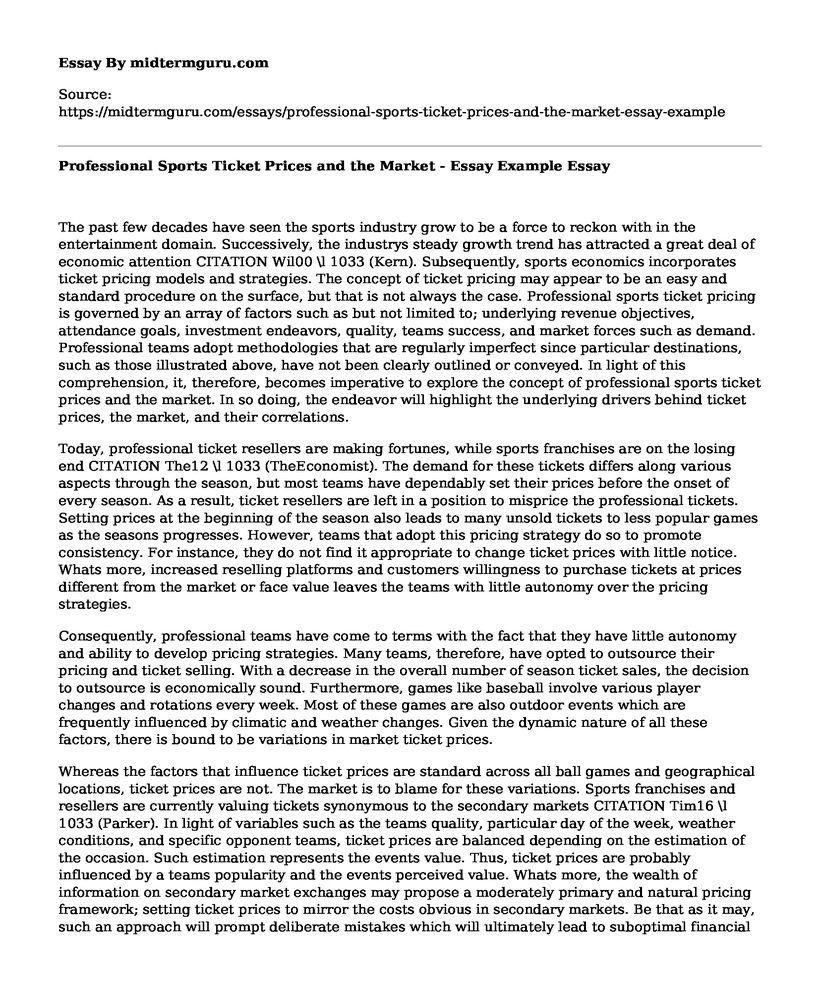The past few decades have seen the sports industry grow to be a force to reckon with in the entertainment domain. Successively, the industrys steady growth trend has attracted a great deal of economic attention CITATION Wil00 \l 1033 (Kern). Subsequently, sports economics incorporates ticket pricing models and strategies. The concept of ticket pricing may appear to be an easy and standard procedure on the surface, but that is not always the case. Professional sports ticket pricing is governed by an array of factors such as but not limited to; underlying revenue objectives, attendance goals, investment endeavors, quality, teams success, and market forces such as demand. Professional teams adopt methodologies that are regularly imperfect since particular destinations, such as those illustrated above, have not been clearly outlined or conveyed. In light of this comprehension, it, therefore, becomes imperative to explore the concept of professional sports ticket prices and the market. In so doing, the endeavor will highlight the underlying drivers behind ticket prices, the market, and their correlations.
Today, professional ticket resellers are making fortunes, while sports franchises are on the losing end CITATION The12 \l 1033 (TheEconomist). The demand for these tickets differs along various aspects through the season, but most teams have dependably set their prices before the onset of every season. As a result, ticket resellers are left in a position to misprice the professional tickets. Setting prices at the beginning of the season also leads to many unsold tickets to less popular games as the seasons progresses. However, teams that adopt this pricing strategy do so to promote consistency. For instance, they do not find it appropriate to change ticket prices with little notice. Whats more, increased reselling platforms and customers willingness to purchase tickets at prices different from the market or face value leaves the teams with little autonomy over the pricing strategies.
Consequently, professional teams have come to terms with the fact that they have little autonomy and ability to develop pricing strategies. Many teams, therefore, have opted to outsource their pricing and ticket selling. With a decrease in the overall number of season ticket sales, the decision to outsource is economically sound. Furthermore, games like baseball involve various player changes and rotations every week. Most of these games are also outdoor events which are frequently influenced by climatic and weather changes. Given the dynamic nature of all these factors, there is bound to be variations in market ticket prices.
Whereas the factors that influence ticket prices are standard across all ball games and geographical locations, ticket prices are not. The market is to blame for these variations. Sports franchises and resellers are currently valuing tickets synonymous to the secondary markets CITATION Tim16 \l 1033 (Parker). In light of variables such as the teams quality, particular day of the week, weather conditions, and specific opponent teams, ticket prices are balanced depending on the estimation of the occasion. Such estimation represents the events value. Thus, ticket prices are probably influenced by a teams popularity and the events perceived value. Whats more, the wealth of information on secondary market exchanges may propose a moderately primary and natural pricing framework; setting ticket prices to mirror the costs obvious in secondary markets. Be that as it may, such an approach will prompt deliberate mistakes which will ultimately lead to suboptimal financial performances by professional sports teams. Moreover, analysis of secondary market information on ticket prices depicts the data can be an effective device at deciding better ticket prices.
In conclusion, the backdrop above depicts that ticket prices are a major concern in professional sports. In light of the significant role that ticket pricing strategies plays, it is imperative for the market to employ a reliable and sustainable pricing strategy. Dynamic pricing seems to be the plausible answer. Such a pricing model will encompass statistical analysis which will be effective in making sound and economic decisions.
Works Cited
BIBLIOGRAPHY Kern, William S. "Introduction to the Economics of Sports." W.E. Upjohn Institute for Employment Research for Employment Research (2000): 1-6. Print.
Parker, Tim. Why The Prices Of Sports Tickets Vary So Much. 2016. Web. 29 October 2016.
TheEconomist. Game Theory. 9 January 2012. Web. 29 October 2016. <http://www.economist.com/blogs/gametheory/2012/01/sports-ticketing>.
Cite this page
Professional Sports Ticket Prices and the Market - Essay Example. (2021, May 24). Retrieved from https://midtermguru.com/essays/professional-sports-ticket-prices-and-the-market-essay-example
If you are the original author of this essay and no longer wish to have it published on the midtermguru.com website, please click below to request its removal:
- Professional Sports Ticket Prices and the Market - Essay Example
- Comparison of Gross Domestic Product - Economics Paper Example
- Exploring the Unique Immigration Experience of Arab Americans in California - Research Paper
- Microsoft's Employee Benefits Package: Achieving the Goal - Essay Sample
- Minimum Wage and Its Impact on Immigrants and Low-Skilled Natives - Essay Sample
- The Changing Dynamics of Business: Globalization, Society & Regulation - Essay Sample
- Monetary and Fiscal Policy - Essay Sample







